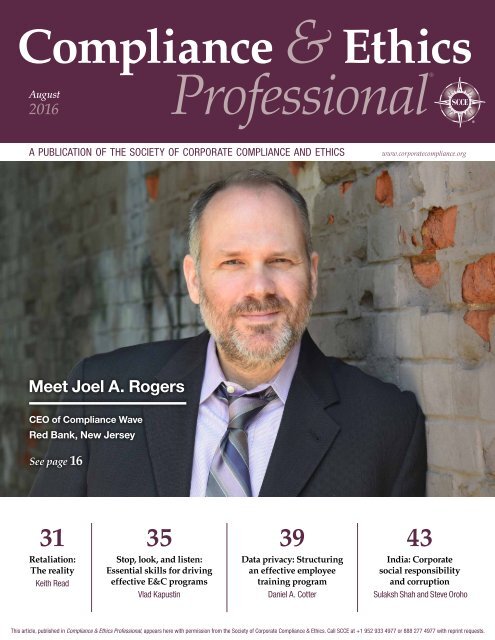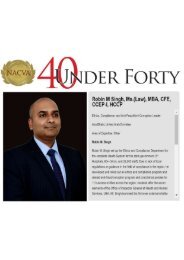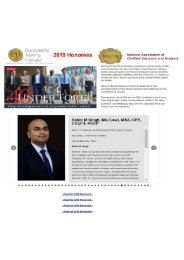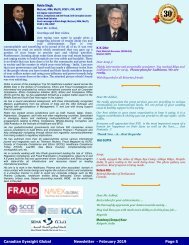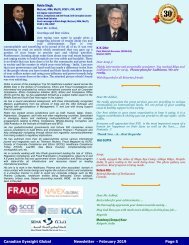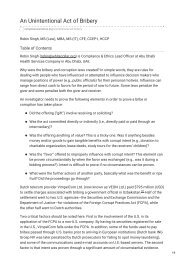Foreign Corrupt Practices Act and UK Bribery Act in developing countries
» All the major world powers, such as China, U.S., UK, or India, have anti-bribery laws/provisions or penalties for misconduct that are embedded in their prevailing laws. » A proactive compliance review can only be undertaken if the compliance officer can understand and widely interpret the key terms embedded in the Foreign Corrupt Practices Act (FCPA) and UK Bribery Act. » FCPA has evolved and grown into the web of prosecuting a conglomerate for the wrongdoings of its child entity, even though minimal practical (or impractical) connections may exist between the two. » Deferred prosecution agreements (DPA) are widely used to give compliance of officers time to put in place the controls embedded in U.S. Sentencing Guidelines. » Compliance officers should develop hypothetical scenarios to help employees understand the effect of FCPA and UK Bribery Act. BY #RobinSingh the #whitecollarinvestigator
» All the major world powers, such as China, U.S., UK, or India, have anti-bribery laws/provisions or penalties for misconduct that are embedded in their prevailing laws. » A proactive compliance review can only be undertaken if the compliance officer can understand and widely interpret the key terms embedded in the Foreign Corrupt Practices Act (FCPA) and UK Bribery Act. » FCPA has evolved and grown into the web of prosecuting a conglomerate for the wrongdoings of its child entity, even though minimal practical (or impractical) connections may exist between the two. » Deferred prosecution agreements (DPA) are widely used to give compliance of officers time to put in place the controls embedded in U.S. Sentencing Guidelines. » Compliance officers should develop hypothetical scenarios to help employees understand the effect of FCPA and UK Bribery Act. BY #RobinSingh the #whitecollarinvestigator
Create successful ePaper yourself
Turn your PDF publications into a flip-book with our unique Google optimized e-Paper software.
Compliance & Ethics<br />
August<br />
2016<br />
Professional®<br />
a publication of the society of corporate compliance <strong>and</strong> ethics<br />
www.corporatecompliance.org<br />
Meet Joel A. Rogers<br />
CEO of Compliance Wave<br />
Red Bank, New Jersey<br />
See page 16<br />
31<br />
Retaliation:<br />
The reality<br />
Keith Read<br />
35<br />
Stop, look, <strong>and</strong> listen:<br />
Essential skills for driv<strong>in</strong>g<br />
effective E&C programs<br />
Vlad Kapust<strong>in</strong><br />
39<br />
Data privacy: Structur<strong>in</strong>g<br />
an effective employee<br />
tra<strong>in</strong><strong>in</strong>g program<br />
Daniel A. Cotter<br />
43<br />
India: Corporate<br />
social responsibility<br />
<strong>and</strong> corruption<br />
Sulaksh Shah <strong>and</strong> Steve Oroho<br />
This article, published <strong>in</strong> Compliance & Ethics Professional, appears here with permission from the Society of Corporate Compliance & Ethics. Call SCCE at +1 952 933 4977 or 888 277 4977 with repr<strong>in</strong>t requests.
y Rob<strong>in</strong> S<strong>in</strong>gh, MSc-Law, MSc-IT, LPEC, CFE<br />
<strong>Foreign</strong> <strong>Corrupt</strong> <strong>Practices</strong><br />
<strong>Act</strong> <strong>and</strong> <strong>UK</strong> <strong>Bribery</strong> <strong>Act</strong> <strong>in</strong><br />
develop<strong>in</strong>g <strong>countries</strong><br />
»»<br />
All the major world powers, such as Ch<strong>in</strong>a, U.S., <strong>UK</strong>, or India, have anti-bribery laws/provisions or penalties for<br />
misconduct that are embedded <strong>in</strong> their prevail<strong>in</strong>g laws.<br />
»»<br />
A proactive compliance review can only be undertaken if the compliance officers can underst<strong>and</strong> <strong>and</strong> widely<br />
<strong>in</strong>terpret the key terms embedded <strong>in</strong> the <strong>Foreign</strong> <strong>Corrupt</strong> <strong>Practices</strong> <strong>Act</strong> (FCPA) <strong>and</strong> <strong>UK</strong> <strong>Bribery</strong> <strong>Act</strong>.<br />
»»<br />
FCPA has evolved <strong>and</strong> grown <strong>in</strong>to a web to prosecute a conglomerate for the wrong do<strong>in</strong>gs of its child entity, even<br />
though m<strong>in</strong>imal practical (or impractical) connections may exist between the two.<br />
»»<br />
Deferred prosecution agreements (DPA) are widely used to give compliance officers time to put <strong>in</strong> place the controls<br />
embedded <strong>in</strong> U.S. Sentenc<strong>in</strong>g Guidel<strong>in</strong>es.<br />
»»<br />
Compliance officers should develop hypothetical scenarios to help employees underst<strong>and</strong> the effect of FCPA <strong>and</strong> <strong>UK</strong><br />
<strong>Bribery</strong> <strong>Act</strong>.<br />
S<strong>in</strong>gh<br />
US companies enforced the <strong>Foreign</strong><br />
<strong>Corrupt</strong> <strong>Practices</strong> <strong>Act</strong> (FCPA)<br />
of 1977 as an action aga<strong>in</strong>st<br />
revelations of widespread <strong>in</strong>cidents of<br />
bribery by foreign officials attempt<strong>in</strong>g to<br />
w<strong>in</strong> bus<strong>in</strong>ess. The <strong>Act</strong> has an impact on<br />
all US companies that are do<strong>in</strong>g<br />
bus<strong>in</strong>ess outside the United States<br />
of America. US companies can<br />
be held liable for acts of their<br />
jo<strong>in</strong>t venture partners, foreign<br />
subsidiaries, <strong>and</strong> all other parties<br />
that are deemed to be act<strong>in</strong>g <strong>in</strong> the<br />
capacity of their agents. A foreign<br />
company that has its presence<br />
<strong>in</strong> the United States <strong>and</strong> all those foreign<br />
entities <strong>and</strong> non-residents that either use<br />
or act upon U.S. wires or mails when <strong>in</strong> the<br />
United States also fall under the scope of<br />
the <strong>Act</strong>.<br />
FCPA keywords<br />
To underst<strong>and</strong> the FCPA of 1977, we must<br />
underst<strong>and</strong> how it def<strong>in</strong>es certa<strong>in</strong> key terms.<br />
Facilitation payments: In United States, a<br />
“grease payment” or a facilitat<strong>in</strong>g payment<br />
refers to a payment made to a foreign party<br />
official, foreign official, or a political party for<br />
performance of rout<strong>in</strong>e government actions<br />
to expedite or speed up performance of those<br />
duties that are non-discretionary <strong>in</strong> nature.<br />
<strong>Foreign</strong> official: The term “foreign official”<br />
refers to leaders of foreign governments,<br />
such as a Prime M<strong>in</strong>ister, president,<br />
<strong>and</strong> other heads of state. The term also<br />
<strong>in</strong>cludes employees of different “agencies”<br />
<strong>and</strong> departments <strong>in</strong> the offices of foreign<br />
governments (e.g., customs officials, tax<br />
officials). A foreign official is thus an officer or<br />
Compliance & Ethics Professional ® August 2016<br />
+1 952 933 4977 or 888 277 4977 www.corporatecompliance.org 63
Compliance & Ethics Professional ® August 2016<br />
employee of a foreign government. He/she can<br />
also be part of a department or an agency of<br />
a public <strong>in</strong>ternational organization. A foreign<br />
official can also be <strong>in</strong> an official capacity on<br />
behalf of a public <strong>in</strong>ternational organization<br />
or a foreign government. Companies must<br />
be particularly cautious when deal<strong>in</strong>g with<br />
nations <strong>in</strong> which many of the organizations<br />
are state-owned, for <strong>in</strong>stance, organizations <strong>in</strong><br />
Ch<strong>in</strong>a or Russia (Section 78dd-1).<br />
Ga<strong>in</strong> <strong>in</strong> the future: Under the <strong>Foreign</strong> <strong>Corrupt</strong><br />
<strong>Practices</strong> <strong>Act</strong>, gifts given to foreign officials<br />
can be also regarded as violations of the FCPA<br />
if the <strong>in</strong>tention for giv<strong>in</strong>g them is to ga<strong>in</strong><br />
favors of a general nature for future prospects<br />
of the said company.<br />
Statute of limitation: The FCPA does not<br />
<strong>in</strong>clude the def<strong>in</strong>ition of a specific statute<br />
of limitations. Rather, the five-year “catchall”<br />
provisions <strong>in</strong> 18 USC 3282 (for crim<strong>in</strong>al<br />
actions) <strong>and</strong> 28 USC 2462 (for civil actions)<br />
apply. Moreover, under 18 USC 3292, <strong>in</strong><br />
a crim<strong>in</strong>al case the DOJ can seek, before<br />
return of an <strong>in</strong>dictment, to suspend the<br />
limitations period if seek<strong>in</strong>g evidence<br />
located <strong>in</strong> a foreign country. In one case,<br />
SEC v. Straub, 1 the court ruled <strong>in</strong> an issue<br />
of first impression concern<strong>in</strong>g 28 USC 2462<br />
(Time for Commenc<strong>in</strong>g Proceed<strong>in</strong>gs 2 ) that<br />
the limitations period did not beg<strong>in</strong> to run,<br />
because the foreign national defendants were<br />
not physically present <strong>in</strong> the U.S.<br />
The <strong>UK</strong> <strong>Bribery</strong> <strong>Act</strong> keywords<br />
The <strong>UK</strong> <strong>Bribery</strong> <strong>Act</strong> of 2010 was enforced<br />
on July 1, 2011. The <strong>Act</strong> applies to <strong>in</strong>cidents<br />
of bribery happen<strong>in</strong>g <strong>in</strong> both private <strong>and</strong><br />
public sectors, <strong>and</strong> applies to not only any<br />
act of bribery that is committed <strong>in</strong> the<br />
United K<strong>in</strong>gdom, but also <strong>in</strong> <strong>countries</strong><br />
where there is adequate connection with the<br />
United K<strong>in</strong>gdom.<br />
Bribe: A bribe is def<strong>in</strong>ed as a f<strong>in</strong>ancial or<br />
other advantage with regard to improper<br />
performance of a function or a position<br />
of trust that should have otherwise been<br />
performed <strong>in</strong> good faith or without any type<br />
of partiality.<br />
Facilitation payments: A facilitation payment<br />
is a k<strong>in</strong>d of bribe <strong>and</strong> should be regarded<br />
as such. For example, when money or other<br />
goods are offered to a government official to<br />
either ensure speedy performance or perform<br />
an exist<strong>in</strong>g duty.<br />
<strong>Foreign</strong> official: Section 6(4) of the <strong>Act</strong> def<strong>in</strong>es<br />
a foreign public official as an <strong>in</strong>dividual who<br />
holds judicial, adm<strong>in</strong>istrative, or legislative<br />
positions. It also refers to all those <strong>in</strong>dividuals<br />
who may carry out a public function for<br />
the public agencies of the country or for a<br />
foreign nation or an agent or an official of an<br />
<strong>in</strong>ternational public organization.<br />
<strong>Foreign</strong> national: Refers to a citizen of a<br />
foreign country who can be held liable for<br />
violat<strong>in</strong>g the <strong>UK</strong> <strong>Bribery</strong> <strong>Act</strong> if such an<br />
<strong>in</strong>cident occurs with<strong>in</strong> United K<strong>in</strong>gdom.<br />
Ga<strong>in</strong> <strong>in</strong> the future: No acts of bribery should<br />
be enterta<strong>in</strong>ed for favorable future prospects<br />
of a company.<br />
Statute of limitations: There is no statute of<br />
limitations def<strong>in</strong>ed by the <strong>Act</strong> as opposed to<br />
the FCPA that clearly def<strong>in</strong>es the same.<br />
What is the difference between a bribe<br />
<strong>and</strong> a gift?<br />
In <strong>countries</strong> like Japan <strong>and</strong> the Middle East,<br />
it is quite customary for a participant to carry<br />
along small gifts for the other attendees <strong>in</strong><br />
the meet<strong>in</strong>g. So should this also be regarded<br />
as a bribe under the <strong>Act</strong>? If the answer is no,<br />
then what is the difference between a gift <strong>and</strong><br />
64 www.corporatecompliance.org +1 952 933 4977 or 888 277 4977
a bribe? If a visitor is offer<strong>in</strong>g a coffee mug as<br />
a gift, will that be tantamount to a bribe or a<br />
gift? Similarly, if the client gifts an official with<br />
two tickets for the Super Bowl, how should<br />
that be treated under the purview of this <strong>Act</strong>?<br />
Whether an item is a bribe or a gift would<br />
depend on how expensive the enterta<strong>in</strong>ment<br />
or the gift is. There are several organizations<br />
that specify <strong>in</strong> their code of conduct a<br />
particular amount beyond which the officials<br />
of that company cannot exceed to prevent<br />
the appearance of bribery for the company.<br />
For <strong>in</strong>stance, Nike has specified a Code of<br />
Conduct accord<strong>in</strong>g to which its officials are<br />
forbidden to accept enterta<strong>in</strong>ment or gifts<br />
cost<strong>in</strong>g $200 or more.<br />
Table 1: Transparency International <strong>Corrupt</strong>ion<br />
Perceptions Index<br />
Rank<br />
Country<br />
2015<br />
Score<br />
2014<br />
Score<br />
2013<br />
Score<br />
2012<br />
Score<br />
1 Denmark 91 92 91 90<br />
2 New Zeal<strong>and</strong> 88 91 91 90<br />
3 F<strong>in</strong>l<strong>and</strong> 90 89 89 90<br />
4 Sweden 89 87 89 88<br />
5 Norway 87 86 86 85<br />
6 Switzerl<strong>and</strong> 86 86 85 88<br />
7 S<strong>in</strong>gapore 84 84 86 87<br />
Key trends of FCPA & <strong>UK</strong> <strong>Bribery</strong> <strong>Act</strong><br />
The enforcement of the FCPA has been hugely<br />
impacted with the passage of Sarbanes Oxley<br />
<strong>in</strong> 2002. The issuers are required to assess, as<br />
well as report on, how effective their <strong>in</strong>ternal<br />
controls are over the subject of f<strong>in</strong>ancial<br />
report<strong>in</strong>g accord<strong>in</strong>g to Section 404 of SOX.<br />
This particular requirement mentioned<br />
<strong>in</strong> SOX has resulted <strong>in</strong> issuers be<strong>in</strong>g more<br />
active for <strong>in</strong>vestigat<strong>in</strong>g all the questionable<br />
transactions, especially <strong>in</strong> all those foreign<br />
subsidies whose records <strong>and</strong> books have been<br />
consolidated with that of the issuers with an<br />
objective of f<strong>in</strong>ancial report<strong>in</strong>g.<br />
Another reason for <strong>in</strong>crease <strong>in</strong> the FCPA<br />
enforcement is due to the way actions related<br />
to FCPA enforcement are resolved, primarily<br />
through deferred prosecution agreement<br />
(DPA) or or non-prosecution agreement (NPA).<br />
The <strong>Corrupt</strong>ion Perceptions Index Report 3<br />
(Table 1) shows the <strong>countries</strong> <strong>in</strong> ascend<strong>in</strong>g<br />
order of their rank <strong>and</strong> is based on how<br />
corrupt the public sector <strong>in</strong> that country is<br />
perceived to be, accord<strong>in</strong>g to Transparency<br />
International. A score of 100 means that the<br />
nation is very clean, 0 <strong>in</strong>dicates that it is<br />
highly corrupt.<br />
8 Netherl<strong>and</strong>s 87 83 83 84<br />
9 Luxembourg 81 82 80 80<br />
10 Canada 83 81 81 84<br />
11 Australia 79 80 81 85<br />
12 Germany 81 79 78 79<br />
13 Icel<strong>and</strong> 79 79 78 82<br />
14 United K<strong>in</strong>gdom 81 78 76 74<br />
15 Belgium 77 76 75 75<br />
15 Japan 75 76 74 74<br />
How have they affected the current policies<br />
across the globe?<br />
Healthcare companies have been globally<br />
susceptible to FCPA violations due to<br />
their large number of customers <strong>and</strong> their<br />
bus<strong>in</strong>ess partners, namely physicians who<br />
are work<strong>in</strong>g <strong>in</strong> public healthcare systems <strong>in</strong><br />
other nations. Any payments made to these<br />
“public officials” (who are non-residents<br />
of the U.S.) for <strong>in</strong>fluenc<strong>in</strong>g their decisions<br />
with respect to exist<strong>in</strong>g or new bus<strong>in</strong>esses<br />
Compliance & Ethics Professional ® August 2016<br />
+1 952 933 4977 or 888 277 4977 www.corporatecompliance.org 65
Compliance & Ethics Professional ® August 2016<br />
are regarded as violations of FCPA, because<br />
they qualify as illegal bribes. In 2007, a<br />
Dutch pharmaceutical company called<br />
Akzo Nobel N.V. was traded on a U.S.<br />
exchange <strong>and</strong> declared that it had entered<br />
<strong>in</strong>to a settlement with Department of<br />
Justice (DOJ) <strong>and</strong> Securities <strong>and</strong> Exchange<br />
Commission (SEC) for<br />
improper payments<br />
that were made by<br />
two of its subsidiaries<br />
to some officials <strong>in</strong><br />
the Iraqi government<br />
under a United<br />
Nations program<br />
called Oil-for-Food.<br />
It has been alleged<br />
that these subsidiaries<br />
made about $280,000<br />
as improper<br />
payments.<br />
Examples of some<br />
orthopedic implant<br />
producers that have<br />
been subjected to<br />
thorough <strong>in</strong>vestigations by U.S. authorities<br />
for possible violations of FCPA <strong>in</strong> the recent<br />
past are Zimmer Hold<strong>in</strong>g Inc., Stryker<br />
Corp, Smith & Nephew plc, Medtronic Inc.,<br />
<strong>and</strong> Biomet Inc.<br />
With the threat of enforcement under<br />
the FCPA <strong>and</strong> <strong>UK</strong> <strong>Bribery</strong> <strong>Act</strong>, people have<br />
started to follow the basic guidel<strong>in</strong>es, which<br />
can be summarized as follows:<br />
··<br />
Implement a whistleblower hotl<strong>in</strong>e;<br />
··<br />
Develop a comprehensive compliance<br />
<strong>and</strong> fraud control program;<br />
··<br />
Implement an approved anti-corruption<br />
framework, policies, <strong>and</strong> procedures;<br />
··<br />
Have a strategic position of chief<br />
compliance officer with a dotted<br />
l<strong>in</strong>e report<strong>in</strong>g to the Board (or Audit<br />
Committee) <strong>and</strong> close, tight <strong>in</strong>teractions<br />
with the Legal Affairs department;<br />
Utilization of third parties<br />
is often required <strong>in</strong> foreign<br />
markets with respect<br />
to the local law <strong>in</strong> that<br />
particular market, or the<br />
third parties are quite<br />
aware about the l<strong>and</strong>scape<br />
<strong>in</strong> the local markets <strong>and</strong><br />
how they should get their<br />
work done.<br />
··<br />
Establish systems for background checks<br />
<strong>and</strong> declaration forms, such as conflict of<br />
<strong>in</strong>terest, gift declarations etc.;<br />
··<br />
Carry out compliance reviews <strong>and</strong><br />
<strong>in</strong>vestigations; <strong>and</strong><br />
··<br />
Have a st<strong>and</strong>ard of conduct, fraud control<br />
policy, whistleblow<strong>in</strong>g policy, etc.<br />
Can third parties<br />
be subject to antibribery<br />
violations?<br />
Utilization of<br />
third parties is<br />
often required <strong>in</strong><br />
foreign markets<br />
with respect to<br />
the local law <strong>in</strong><br />
that particular<br />
market, or the<br />
third parties are<br />
quite aware about<br />
the l<strong>and</strong>scape<br />
<strong>in</strong> the local<br />
markets <strong>and</strong><br />
how they should<br />
get their work done. However, if a third<br />
party is well-acqua<strong>in</strong>ted with the means of<br />
gett<strong>in</strong>g th<strong>in</strong>gs done <strong>in</strong> the local l<strong>and</strong>scape,<br />
it also signifies that it can make improper<br />
payments on behalf of its company, thus<br />
violat<strong>in</strong>g the anti-bribery provisions.<br />
For example, <strong>in</strong> the case of U.S. v.<br />
Bourke, 4 there was an affirmation by the<br />
concerned court for conviction of the<br />
defendant for conspir<strong>in</strong>g <strong>in</strong> the FCPA<br />
violation. The court held <strong>in</strong> this case that<br />
even if the defendant had not participated<br />
<strong>in</strong> an act of bribery (which was supported<br />
only by circumstantial evidence), he was<br />
aware that this particular conduct was<br />
meant to <strong>in</strong>fluence the privatization of a<br />
state-owned oil company. This awareness<br />
was adequate to issue charges related<br />
to FCPA.<br />
66 www.corporatecompliance.org +1 952 933 4977 or 888 277 4977
The FCPA has laid down payment<br />
provisions for the third parties <strong>and</strong> thus,<br />
it is vital for all such cases where these<br />
anti-bribery provisions are applicable to<br />
the third-parties, to adopt procedures <strong>and</strong><br />
policies related to both post-engagement<br />
<strong>and</strong> engagement obligations towards a<br />
third-party <strong>and</strong> conduct pre-engagement<br />
with respect to due diligence.<br />
Stretch<strong>in</strong>g the concept of third party<br />
Under 15 USC Section 78m(b)(2)(B), issuers<br />
are required to devise <strong>and</strong> ma<strong>in</strong>ta<strong>in</strong> a<br />
system of <strong>in</strong>ternal<br />
account<strong>in</strong>g controls<br />
sufficient to<br />
provide reasonable<br />
assurances of control<br />
<strong>and</strong> authority over<br />
the firm’s assets. This<br />
<strong>in</strong> turn states that a<br />
mother company will<br />
be held responsible<br />
for mischievous<br />
action of its<br />
subsidiary, provided<br />
they have an equal<br />
participation/<br />
reasonable<br />
knowledge or, at a m<strong>in</strong>imum, have a<br />
practical relationship.<br />
Today companies/organizations can have<br />
their subsidiaries or sub-subsidiaries <strong>in</strong> any<br />
part of the world. In the recent past, we have<br />
seen the concept of “practical <strong>in</strong>teraction”<br />
has been stretched to unimag<strong>in</strong>able limits<br />
by the <strong>in</strong>vestigat<strong>in</strong>g authorities, such as the<br />
SEC <strong>and</strong> DOJ. The best example that comes<br />
to my m<strong>in</strong>d is that of Football Fédération<br />
Association’s FCPA case (completely EU<br />
based) <strong>in</strong> which jurisdiction was established<br />
because of sport<strong>in</strong>g goods be<strong>in</strong>g sold <strong>in</strong><br />
the USA by another company, which had<br />
m<strong>in</strong>imal ties to the FIFA.<br />
Under 15 USC Section<br />
78m(b)(2)(B), issuers are<br />
required to devise <strong>and</strong><br />
ma<strong>in</strong>ta<strong>in</strong> a system of<br />
<strong>in</strong>ternal account<strong>in</strong>g controls<br />
sufficient to provide<br />
reasonable assurances of<br />
control <strong>and</strong> authority over<br />
the firm’s assets.<br />
Let’s not forget that US courts function<br />
on the precedence of the previous case. So, if<br />
it is established that a mother company has<br />
practical ties (even though they might not<br />
have a practical work<strong>in</strong>g relationship with the<br />
bottom-most subsidiary), it can be <strong>in</strong>dicted<br />
<strong>and</strong> tried for crimes for which they might not<br />
have a clue.<br />
Hypothetical situations with the FCPA<br />
··<br />
Mr. X is a citizen of KLM country who works<br />
for an American firm on the sub-cont<strong>in</strong>ent.<br />
In order to secure bus<strong>in</strong>ess <strong>in</strong> Australia,<br />
Mr. X authorized<br />
the payment of<br />
thous<strong>and</strong>s of<br />
dollars to certa<strong>in</strong><br />
government officials.<br />
Although Mr. X<br />
knows this violates<br />
the provisions of the<br />
FCPA, he believes<br />
this law only<br />
applies to American<br />
citizens. Is Mr. X<br />
subject to the FCPA?<br />
Yes! Under the<br />
FCPA it is illegal to<br />
provide payments<br />
to ga<strong>in</strong> an illicit bus<strong>in</strong>ess advantage<br />
among foreign citizens employed by or<br />
act<strong>in</strong>g as agents for the United States<br />
(although the firm operates outside of<br />
USA jurisdiction, it is still a USA firm).<br />
Mr. X is violat<strong>in</strong>g the FCPA.<br />
··<br />
A government official of a small tax heaven<br />
like Panama wants your company to donate<br />
$5 million to a chosen charity for orphan<br />
children <strong>in</strong> his country, before he’ll consent<br />
to do bus<strong>in</strong>ess with you. The official will not<br />
receive any of the money. S<strong>in</strong>ce the money is<br />
go<strong>in</strong>g to a good cause, is it considered to be a<br />
bribe under the FCPA?<br />
Compliance & Ethics Professional ® August 2016<br />
+1 952 933 4977 or 888 277 4977 www.corporatecompliance.org 67
Compliance & Ethics Professional ® August 2016<br />
Yes! A charitable contribution of<br />
value used to “<strong>in</strong>fluence” a bus<strong>in</strong>ess<br />
decision is a violation of the FCPA. Just<br />
because a bribe is not paid directly to<br />
a foreign official does not mean the<br />
company offer<strong>in</strong>g the bribe is safe from<br />
prosecution. New guidance on the<br />
FCPA seeks to close loopholes regard<strong>in</strong>g<br />
<strong>in</strong>direct <strong>in</strong>ducements.<br />
Hypothetical situations with the<br />
<strong>UK</strong> <strong>Bribery</strong> <strong>Act</strong><br />
··<br />
A manufactur<strong>in</strong>g company headquartered<br />
<strong>in</strong> the sub-cont<strong>in</strong>ent has been charged with<br />
violation to the <strong>Act</strong> for mak<strong>in</strong>g improper<br />
payments/giv<strong>in</strong>g bribes to a foreign official<br />
<strong>in</strong> the <strong>UK</strong> Virg<strong>in</strong> Isl<strong>and</strong>s. The company had<br />
no <strong>in</strong>itial ties with <strong>UK</strong>. Later the company<br />
was acquired by a <strong>UK</strong>-based company. The<br />
company <strong>in</strong>herited this problem, as the<br />
alleged case of violation had taken place at<br />
a company they acquired many years ago.<br />
However, the <strong>in</strong>cident of violation was<br />
uncovered recently after the acquisition. Are<br />
they still liable for violation of the <strong>Bribery</strong><br />
<strong>Act</strong>?<br />
Yes! Even though the <strong>in</strong>cident occurred<br />
before the acquisition, it is tantamount<br />
to a violation of the <strong>UK</strong> <strong>Bribery</strong> <strong>Act</strong>,<br />
<strong>and</strong> such an act could be enforced as a<br />
violation of the <strong>Act</strong>. Thus it is sure that a<br />
company operat<strong>in</strong>g <strong>in</strong> the sub-cont<strong>in</strong>ent<br />
<strong>and</strong> hav<strong>in</strong>g a branch <strong>in</strong> the <strong>UK</strong> will be<br />
liable.<br />
··<br />
But what happens <strong>in</strong> the same case when<br />
a Middle Eastern company owns a <strong>UK</strong><br />
subsidiary? Would the parent company,<br />
which is a separate legal entity, be<br />
similarly liable?<br />
Maybe! One would need to evaluate<br />
whether the subsidiary’s activities form<br />
part of the parent’s bus<strong>in</strong>ess operations,<br />
<strong>and</strong> the degree of ownership <strong>and</strong><br />
control exerted. This will determ<strong>in</strong>e<br />
if the Middle Eastern parent company<br />
would be “<strong>in</strong> essence” carry<strong>in</strong>g out<br />
bus<strong>in</strong>ess <strong>in</strong> the <strong>UK</strong>.<br />
Penalties for violation of FCPA & <strong>UK</strong>BA<br />
A violation of FCPA can lead to a penalty<br />
of up to twice the amount the payer tried<br />
to obta<strong>in</strong> through mak<strong>in</strong>g the payment<br />
improperly. Although FCPA mentions<br />
the civil <strong>and</strong> crim<strong>in</strong>al penalty <strong>and</strong> f<strong>in</strong>e<br />
amounts, they are not of much importance<br />
for arriv<strong>in</strong>g at the actual amount of penalty<br />
<strong>and</strong> f<strong>in</strong>e when the enforcement action is<br />
assessed.<br />
Table 2 (on page 69) shows some of the<br />
biggest settlements made by corporations<br />
with respect to violation of FCPA.<br />
How are corruption f<strong>in</strong>es, penalties, <strong>and</strong><br />
sentences calculated?<br />
It is immaterial whether the bribery acts that<br />
are a part of the offense took place <strong>in</strong> United<br />
K<strong>in</strong>gdom or otherwise. Though FCPA <strong>in</strong><br />
certa<strong>in</strong> scenarios may permit facilitation,<br />
<strong>UK</strong>BA does not allow mak<strong>in</strong>g facilitat<strong>in</strong>g<br />
payments that are unofficial payments given<br />
to public nationals for expedit<strong>in</strong>g or secur<strong>in</strong>g<br />
the performance of necessary services. There<br />
have been cases of <strong>in</strong>vestigations made by<br />
United K<strong>in</strong>gdom Serious Fraud Office (SFO)<br />
between the months of July to October 2014,<br />
look<strong>in</strong>g <strong>in</strong>to accusations of corrupt practices<br />
that were conducted by the representatives<br />
or employees of <strong>UK</strong> companies <strong>in</strong> the Middle<br />
Eastern companies. These <strong>in</strong>vestigations are,<br />
however, <strong>in</strong> nascent phases <strong>and</strong> their f<strong>in</strong>al<br />
results cannot be predicted at this po<strong>in</strong>t,<br />
but they are a strong rem<strong>in</strong>der to any <strong>UK</strong><br />
company that has its commercial operations<br />
<strong>in</strong> the Middle East that it cannot escape<br />
the attention of the authorities of United<br />
K<strong>in</strong>gdom where there are sufficient reasons<br />
for <strong>in</strong>vestigation.<br />
68 www.corporatecompliance.org +1 952 933 4977 or 888 277 4977
Table 2: Corporate settlements for FCPA violations<br />
Company Country Year<br />
1 Alcoa (U.S.) US 2014<br />
2 Total (France) France 2013<br />
3<br />
4<br />
5<br />
6<br />
Weatherford<br />
International<br />
JGC Corporation<br />
BAE System<br />
Plc.<br />
Snamprogetti<br />
Netherl<strong>and</strong>s<br />
B.V. / ENI S.p.A<br />
Switzerl<strong>and</strong> 2013<br />
Japan 2011<br />
<strong>UK</strong> 2010<br />
Holl<strong>and</strong>/Italy 2010<br />
7 Technip S.A. France 2010<br />
8 Daimler AG Germany 2010<br />
F<strong>in</strong>es<br />
(<strong>in</strong> $)<br />
384<br />
million<br />
398<br />
million<br />
152.6<br />
million<br />
218.8<br />
million<br />
400<br />
million<br />
365<br />
million<br />
338<br />
million<br />
185<br />
million<br />
As a strong measure to ensure compliance<br />
with the FCPA, the government of the U.S. has<br />
given several guidel<strong>in</strong>es to the companies to be<br />
followed. 5 Some of them <strong>in</strong>clude:<br />
··<br />
Expect<strong>in</strong>g that the compliance programs are<br />
not simply left isolated, but are effectively<br />
Summary<br />
<strong>Corrupt</strong> payments to<br />
a royal family from<br />
the Middle East via<br />
London consultant to<br />
rema<strong>in</strong> supplier an<br />
alum<strong>in</strong>ium plant <strong>in</strong><br />
the Middle East<br />
Payments to Iranian<br />
foreign officials to<br />
obta<strong>in</strong> oil <strong>and</strong> gas<br />
contracts<br />
Bribes for foreign<br />
officials to obta<strong>in</strong><br />
contracts <strong>in</strong> the<br />
Middle East <strong>and</strong> Africa<br />
EPC Contracts, Nigeria<br />
liquefied natural gas<br />
plant bribes<br />
Defence contractor<br />
who paid market<strong>in</strong>g<br />
fees via offshore<br />
companies it set up<br />
to obta<strong>in</strong> contracts.<br />
Pay<strong>in</strong>g of bribes<br />
through London <strong>and</strong><br />
Japanese-based<br />
<strong>in</strong>termediaries to<br />
obta<strong>in</strong> Nigerian LNG<br />
plant contracts<br />
Bribes to Nigerian officials<br />
to obta<strong>in</strong> LNG<br />
plant construction<br />
contracts<br />
<strong>Corrupt</strong> payments to<br />
Russian government<br />
officials to secure<br />
contracts to sell cars<br />
monitored <strong>and</strong> implemented<br />
at the corporate levels on a<br />
regular basis.<br />
··<br />
Giv<strong>in</strong>g more credibility<br />
to all those companies that<br />
comply with a risk-centric<br />
approach for comply<strong>in</strong>g<br />
with the FCPA.<br />
··<br />
The government has<br />
directed the companies to<br />
re-evaluate their compliance<br />
programs on a regular basis.<br />
··<br />
Coverage of basic<br />
tra<strong>in</strong><strong>in</strong>gs such as<br />
whistleblow<strong>in</strong>g, fraud <strong>and</strong><br />
misconduct, conflicts of<br />
<strong>in</strong>terest, anti-corruption, etc.,<br />
<strong>and</strong> employee track records,<br />
attendance, etc.<br />
··<br />
Other factors such as<br />
value, proportionality,<br />
tim<strong>in</strong>g <strong>and</strong> appropriateness<br />
of the expenditure <strong>in</strong> each<br />
<strong>and</strong> every situation. None<br />
of these factors, alone or<br />
comb<strong>in</strong>ed, will be sufficient<br />
without “crim<strong>in</strong>al <strong>in</strong>tent” as<br />
required by all jurisdictions.<br />
··<br />
In addition, as a side<br />
note, the U.S. Supreme<br />
Court’s verdict <strong>in</strong> McDonnell<br />
v. United States 6 has tighten<br />
the def<strong>in</strong>ition of corruption<br />
by def<strong>in</strong><strong>in</strong>g “official act”,<br />
which might have a bear<strong>in</strong>g<br />
on future cases, if the whole<br />
act will be constituted as<br />
corruption or not.<br />
The United K<strong>in</strong>gdom is one of the least<br />
corrupt nations <strong>in</strong> the list of 170 nations on the<br />
latest <strong>Corrupt</strong>ion Perceptions Index. The <strong>UK</strong><br />
has taken several steps to tackle corruption<br />
<strong>in</strong> the recent years. The <strong>UK</strong> government has<br />
Compliance & Ethics Professional ® August 2016<br />
+1 952 933 4977 or 888 277 4977 www.corporatecompliance.org 69
established the National Crime<br />
Agency <strong>and</strong> the Serious <strong>and</strong><br />
Organized Crime Strategy to<br />
improve the overall response<br />
<strong>in</strong> the nation to severe crimes<br />
related corruption <strong>and</strong> bribery.<br />
Table 3: Comparison snapshot of the two laws<br />
<strong>Bribery</strong> of foreign<br />
(public) officials<br />
FCPA<br />
<strong>UK</strong>BA<br />
Both the FCPA <strong>and</strong> <strong>Bribery</strong> <strong>Act</strong> make it an offence to<br />
bribe foreign (public) officials. Under the <strong>Bribery</strong> <strong>Act</strong> a<br />
“foreign public official” is def<strong>in</strong>ed more narrowly than<br />
under the FCPA.<br />
Compliance & Ethics Professional ® August 2016<br />
What are the key defenses <strong>in</strong><br />
case of FCPA <strong>and</strong> <strong>UK</strong>BA?<br />
FCPA<br />
In the case of FCPA, there are two<br />
available affirmative defenses.<br />
The first defense is pay<strong>in</strong>g<br />
“anyth<strong>in</strong>g of value” <strong>and</strong> “lawful<br />
as per the written regulations<br />
<strong>and</strong> laws” <strong>in</strong> the country of the<br />
foreign resident. The second<br />
defense is related to payment<br />
made with respect to “anyth<strong>in</strong>g<br />
of value” that was a bona fide<br />
<strong>and</strong> reasonable expenditure, such<br />
as expenses related to lodg<strong>in</strong>g<br />
<strong>and</strong> travel that is <strong>in</strong>curred on<br />
behalf or by a foreign official <strong>and</strong><br />
is directly associated with either<br />
the explanation, demonstration,<br />
or promotion of products <strong>and</strong>/or<br />
services or for performance or<br />
execution of a contract along<br />
with a foreign agency <strong>and</strong><br />
government.<br />
In the 2012 case of SEC v.<br />
Jackson, 7 the trial court <strong>in</strong>ferred<br />
that the SEC must <strong>in</strong>cur the load of negat<strong>in</strong>g<br />
the “facilitat<strong>in</strong>g payments exception.”<br />
Private-to-private<br />
bribery<br />
<strong>Act</strong>ive <strong>and</strong><br />
passive bribery /<br />
Scope<br />
Failure to prevent<br />
bribery<br />
Intent<br />
Liability<br />
Facilitation<br />
payments<br />
Promotional<br />
expenses<br />
<strong>UK</strong> <strong>Bribery</strong> <strong>Act</strong><br />
An act of pay<strong>in</strong>g anyth<strong>in</strong>g of value is not<br />
considered to be a violation aga<strong>in</strong>st the <strong>UK</strong><br />
<strong>Bribery</strong> <strong>Act</strong> if it is permissible under the written<br />
laws of that foreign country where the act<br />
has occurred. Other factors highlight<strong>in</strong>g key<br />
differences aga<strong>in</strong>st FCPA have been highlighted<br />
<strong>in</strong> Table 3. ✵<br />
Does not cover bribery on a<br />
private level<br />
Covers active bribery (i.e.,<br />
giv<strong>in</strong>g of bribe)<br />
The philosophy is that the<br />
company is responsible for<br />
the acts of employees <strong>and</strong><br />
agents, so the organization<br />
needs to have proactive<br />
controls <strong>in</strong> place<br />
Person offer<strong>in</strong>g the bribe did<br />
so with a “corrupt” <strong>in</strong>tent. I<br />
believe <strong>in</strong>tent would always<br />
exist while brib<strong>in</strong>g.<br />
A company subject to<br />
US jurisdiction can be<br />
held liable for acts of its<br />
employees, agents, <strong>and</strong><br />
subsidiaries<br />
Exemption for facilitation<br />
payments<br />
Promotional expenses act as<br />
a defense<br />
Covered<br />
Covers both active <strong>and</strong><br />
passive bribery (i.e.,<br />
the tak<strong>in</strong>g or giv<strong>in</strong>g of<br />
a bribe)<br />
Creates a strict liability<br />
corporate offence for<br />
failure to prevent<br />
bribery. They look if<br />
a company has good<br />
compliance program/<br />
procedures <strong>in</strong> place<br />
No written requirement<br />
for a “corrupt” or<br />
“improper” <strong>in</strong>tent <strong>in</strong><br />
relation to the bribery<br />
of a foreign public<br />
official, is implied.<br />
Section 7 of the <strong>Act</strong><br />
creates a strict liability<br />
for failure to prevent<br />
such acts.<br />
No exemption<br />
No defense<br />
1. SEC v. Straub, et al. Southern District of New York, February 8, 2013.<br />
Available at http://bit.ly/sec-v-straub<br />
2. Time for Commenc<strong>in</strong>g Proceed<strong>in</strong>gs. See http://bit.ly/uscode-cornell<br />
3. Transparency International. Available at http://bit.ly/trans-cpi<br />
4. United States v. Viktor Kozeny <strong>and</strong> Frederick Bourke, Jr. Southern<br />
District of New York, 667 F.3d 122 (2d Cir. 2011), Available at<br />
http://bit.ly/us-v-viktor<br />
5. U.S. Department of Justice: The Fraud Section’s <strong>Foreign</strong> <strong>Corrupt</strong><br />
<strong>Practices</strong> <strong>Act</strong> Enforcement Plan <strong>and</strong> Guidance. April 5, 2016.<br />
Available at http://bit.ly/usdod-fraud<br />
6. McDonnell v. United States. October 2015. Syllabus available at<br />
http://bit.ly/mcdonnell-v-us<br />
7. SEC v. Mark A. Jackson <strong>and</strong> James J. Ruehlen. Enforcement release<br />
No. 3564, July 7, 2014. Available at http://bit.ly/sec-v-mark<br />
Rob<strong>in</strong> S<strong>in</strong>gh (rob<strong>in</strong>s<strong>in</strong>gh002@yahoo.com) is a Compliance <strong>and</strong> Fraud<br />
Exam<strong>in</strong>er <strong>in</strong> the Health Services division of the Abu Dhabi (United Arab<br />
Emirates) government. @drob<strong>in</strong>s<strong>in</strong>gh http://bit.ly/li-Rob<strong>in</strong>S<strong>in</strong>gh<br />
70 www.corporatecompliance.org +1 952 933 4977 or 888 277 4977


